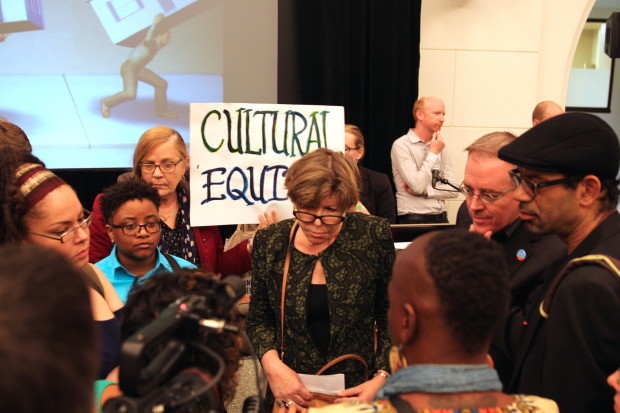Community Turns Up the Volume to Defend Residents and Businesses
Oct 23, 2015
Posted in Affordable Housing, Arts and Culture, Business, Economic Development, Equal Rights/Equity, Gentrification, Housing/Foreclosures
Activists demand “Development Without Displacement” after mayor’s staff says there is no housing crisis in Oakland

Community members and anti-displacement activists surround city Planning and Building Director Rachel Flynn Oct. 19 at the Downtown Specific Plan design workshop. Photo by Tulio Ospina
By Ashley Chambers and Tulio Ospina
Community members are raising the volume on their demands that the city protect Oaklanders’ rights following a number of noise complaints by a few residents targeting Lake Merritt drummers and Black churches.
A number of creative artists, singers, and community and faith leaders made their voices and musical instruments heard Monday evening at the Rally to Defend Oakland’s Culture, calling on city government to stand up for cultural equity in Oakland.
The rally in front of the Rotunda Building at Frank Ogawa Plaza, organized by the Oakland Creative Neighborhoods Coalition (OCNC), included performances by poets, the Oakland Creative Voices Choir and spoken word by the group Young, Gifted & Black.
Speakers included Robbie Clark of Causa Justa; Chaney Turner of Black Lives Matter, Bay Area chapter; artist and director of CultureStrike, Favianna Rodriguez; Pastor Phyllis Scott, Tree of Life Empowerment Ministries; and Post publisher Paul Cobb.
The speakers loudly defended the freedom of creative and cultural expression, and voiced their concerns that the local arts and culture community has been left out of the city’s planning process on the development of downtown Oakland.
“They can develop, but they are not going to displace us,” said Cobb, speaking at the rally.
“We wanna give the drummer some,” he said. “We want to make sure that our gospel singers don’t have to close their windows, and we want to make sure that our creative artists and our nonprofit organizations have a place to exist in this city to serve the population.”
The protest was held in front of the first of the city’s workshops to inform residents of the Downtown Specific Plan and designed to receive input on the area’s redevelopment, but arts and culture activists are saying they have not been invited to the table.
The workshops were created following a report released by San Francisco Planning & Urban Research (SPUR), funded by the city, that community activists say is a roadmap to gentrification.
According to Eric Arnold, a member of the OCNC steering committee, the SPUR report, titled “Downtown for Everyone,” is “a blueprint for exclusion of people of color and low-income residents, as well as the creative arts community” from downtown Oakland.
The SPUR report also contends that speculative construction in the downtown area is being inhibited by commercial rents that are too low and a lack of big tenants. Critics of the report say nonprofits and small commercial tenants are already being pushed out of downtown area by recent uncontrolled rent increases.
As the rally ended, attendees flowed into the workshop to make sure their opinions were heard throughout the chambers.
“We want cultural equity, affordable housing and anti-displacement protections for the existing residents and commercial sector throughout the city that have made Oakland such a vibrant and desirable place to live,” community members demanded.
OCNC demanded that the city’s Cultural Arts Commission be restored and called for a fully staffed Cultural Arts Department to ensure prioritization for Oakland’s historically underrepresented communities.
They also want to pass ordinances to preserve Oakland’s cultural diversity. Earlier this year, Mayor Libby Schaaf showed support for creating a Black Arts Movement Cultural District down 14th Street in downtown Oakland but has not yet acted on the proposal.
During the workshop on Monday, Rachel Flynn, Director of Planning and Building, was surrounded by activists demanding clarity on a controversial statement she made earlier this month claiming that there was no housing crisis in Oakland.
Faith leaders are also reacting to the city’s support for complaints from a handful of residents who are saying church worship is too loud.
“Our music and the way that we worship God is an expression of our heritage and our creativity,” said Pastor Scott at the Monday night rally. “Nobody should tell us that we have to express our creativity in the way they say so. We need to keep the creative juices flowing through Oakland.”
Pleasant Grove Baptist Church in West Oakland is potentially facing $500-a-day fines from the city. In response, Pastor Thomas Harris of Pleasant Grove is bringing local clergy together for an outdoor worship service on Saturday, Nov. 7 from 10 a.m. to 2 p.m. on Adeline St. between 10th and 14th St.
He said it is a time for churches to worship in the streets and invite to neighbors and people of all backgrounds to join in community fellowship.
Defending community voices, Vice Mayor Rebecca Kaplan spoke at this week’s City Council meeting.
“Psalm 98:4 says make a joyful noise unto the Lord,” she said. “The laws require us to respect freedom of religious practice, and it is certainly my hope that we will do just that.”
According to Theo Williams of the SambaFunk! Funkquarians and journalist Zenophon Abraham, the problem isn’t the complaints but that the city and police are listening to them.
“If the complaint came from a 911 call, then that’s against California Penal Code Section 148.3 on ‘False Reporting of an Emergency,’” said Abraham in a letter to several city officials.
“You specifically allowed a single person to violate (the law) and without action,” he said. “You can’t get by with the idea that someone did not report that the complainer was in violation of the law.”
d